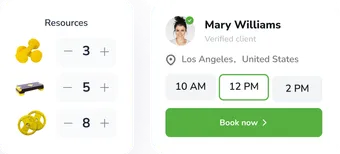Handyman on-call as a business: first steps
Are you someone who's good at fixing things and enjoys helping others? Starting a handyman on-call business could be a great opportunity for you. As a handyman, you can offer various home repair and maintenance services to people in your community. But before you begin, there are a few important steps to take. This guide will walk you through those steps using simple language. We'll help you assess your skills, create a strong brand, and provide great customer service. By following these steps, you'll be on your way to running a successful and rewarding handyman business. Let's get started!
The cost to start a handyman on-call business can vary, but you'll generally need to budget anywhere from $1500 to $5,000 for tools and equipment, depending on the scale and complexity of your services.
The average hourly wage for a handyman typically ranges from $20 to $50 per hour, depending on location, skill level, experience, and the specific services provided.
Handyman services often use online scheduling software, such as EasyWeek, to streamline appointment management, dispatching, and communication with clients conveniently and organized.

Choose a niche – narrow your handyman services
Understanding your niche in the handyman industry is important because it brings several benefits:
Specialization and expertise. Focusing on a specific niche allows you to specialize your skills and knowledge in that area. You can become an expert in your chosen field, gaining experience and proficiency that sets you apart from generalist handymen.
Competitive advantage. A niche gives you a competitive edge in the market. It differentiates you from general handymen and allows you to target a specific audience. Clients seeking specialized services are more likely to choose a handyman specializing in their needs.
Targeted marketing. Understanding your niche allows you to tailor your marketing efforts to reach your target audience more effectively. You can craft targeted messages and advertisements that resonate with potential customers seeking your services. This improves your marketing ROI and attracts the right clients to your business.
Increased referrals. When you establish yourself as a specialist in a particular niche, satisfied customers are more likely to recommend your services to others with similar needs. This word-of-mouth referral can be a powerful source of new business, helping you grow your customer base organically.
Efficiency and productivity. Focusing on a niche allows you to optimize your workflow and work more efficiently. You become familiar with the tools, techniques, and materials specific to your niche, which leads to faster job completion and higher-quality work. This efficiency increases your productivity, allowing you to take on more projects and generate more revenue.

Define your handyman service target audience
The target audience for a handyman service can vary depending on the specific niche and services offered. However, in general, the target handyman business audience includes:
Homeowners. Homeowners who need assistance with various repairs, maintenance, or improvement projects around their house.
Renters. Renters needing help fixing or improving their rented property may not have the necessary skills or tools.
Real estate agents. Real estate agents who need quick repairs or improvements to prepare a property for sale or rental.
Property managers. Property management companies or individual property owners who need ongoing maintenance and repairs for their rental properties.
Small business owners. Small business owners who require maintenance, repairs, or improvement services for their commercial spaces.
Seniors and elderly individuals. Older people may need assistance with accessibility modifications, safety upgrades, or general repairs around their homes.
Busy professionals. Professionals who lead busy lives and prefer to outsource their home maintenance and repair tasks to a reliable handyman service.
It's important for a handyman service to identify their specific target audience and tailor their marketing efforts to reach and appeal to that particular group. Understanding the target audience's needs and preferences helps develop effective marketing strategies and deliver services that cater to their requirements.

Handyman service business plan
A handyman business plan typically includes the following sections:
Executive summary
Provide an overview of your handyman business, including the mission statement, key objectives, target market, and a summary of your services. This section should be concise but compelling, grabbing the reader's attention.
Company description
Describe your handyman business in detail, including the legal structure (sole proprietorship, partnership, LLC, etc.), location, and any unique aspects that set you apart from competitors. Explain your vision, values, and long-term goals for the business.
Services offered
List and describe the specific handyman services you offer. This could include general repairs, plumbing, electrical work, carpentry, painting, installations, and more. Highlight any specialized services or areas of expertise that make your business unique.
Market analysis
Conduct market research to understand your target area's demand for handyman services. Identify your target market and its demographics, needs, and preferences. Analyze your competition to determine its strengths and weaknesses. Use this information to identify opportunities and develop strategies to attract customers.
Marketing and sales strategy
Outline your marketing and sales approaches to reach your target audience. Describe how you will promote your services through online and offline channels like websites, social media, local advertising, and word-of-mouth referrals. Include pricing strategies, special promotions, and customer acquisition tactics.
Operational plan
Explain the day-to-day operations of your handyman business. Detail the tools, equipment, and resources needed to deliver your services efficiently. Describe your workflow, scheduling process, and any subcontractors or employees you may hire. Outline how you will ensure high-quality workmanship and customer satisfaction.
Financial plan
Create a financial forecast that includes startup costs, estimated revenue, and projected expenses for at least the first year. Include pricing structures, profit margins, and sales targets. Outline your funding sources, such as personal savings, loans, or investments. Consider cash flow management, budgeting, and strategies for business growth.
Risk assessment
Identify potential risks and challenges that could affect your handyman business. Develop strategies to mitigate these risks, such as obtaining insurance coverage, ensuring safety protocols, and maintaining contingency plans.
Conclusion
Summarize the key points of your handyman business plan and reiterate your goals. Include any supporting documents in an appendix, such as resumes, licenses, permits, or market research data.
Remember, a business plan is a dynamic document that should be regularly reviewed and updated as your business evolves. It serves as a roadmap to guide your decision-making and help you achieve success in your handyman business.

Initial & monthly expenses for a handyman on-call business
Initial expenses:
Tools and equipment. The cost of purchasing or upgrading tools and equipment specific to your handyman services can range from $500 to $5,000 or more.
Vehicle. Consider the purchase or lease costs, as well as fuel, maintenance, and insurance, which can amount to $200 to $800 per month.
Licensing and permits. Fees for obtaining necessary licenses and permits may range from $100 to $500.
Insurance. Costs for liability insurance, workers' compensation insurance (if applicable), and other insurance policies can vary but typically start around $100 to $200 per month.
Marketing and advertising. Expenses for creating a website, printing business cards, advertising in local directories, or running online marketing campaigns may range from $100 to $500 or more initially.
Business registration. Fees associated with registering your business and obtaining a business license can be around $50 to $200.
Professional services. Costs for consulting with an attorney, accountant, or business advisor may range from $500 to $2,000 or more, depending on the complexity of your needs.
Training and certifications. Expenses for acquiring necessary certifications or attending training programs can vary, starting from $100 to $500 or more.
Monthly expenses:
Rent/Utilities. Costs for rent and utilities (electricity, water, internet) can range from $200 to $800 per month.
Insurance premiums. Monthly payments for insurance coverage, including liability and workers' compensation insurance, can be around $100 to $300.
Marketing and advertising. Ongoing expenses for online advertising, website maintenance, and printed materials can be around $100 to $500 monthly.
Vehicle expenses. Monthly costs for fuel, vehicle maintenance, insurance, and any loan or lease payments may range from $100 to $400 or more.
Supplies and materials. Regularly replenishing supplies such as tools, hardware, cleaning products, and other materials needed for your services can vary based on usage, typically around $100 to $500 monthly.
Phone and communication. Costs for phone services, mobile plans, internet connection, and any software or applications used for communication and project management can range from $50 to $150 per month.
Professional fees. Ongoing payments for professional services like accounting or legal assistance can vary but typically cost $100 to $300 monthly.
Miscellaneous expenses. Other miscellaneous costs related to running your business, such as office supplies, subscriptions, or professional development resources, may add up to $50 to $200 per month.
Remember that these numbers are estimates and can vary based on location, business size, and specific circumstances. It's essential to research and create a tailored budget based on your individual needs and market conditions.

How to attract clients to a handyman service
To attract clients to your handyman service, implement the following strategies:
Online presence. Create a professional website and utilize social media platforms to showcase your services, engage with potential clients, and share customer testimonials.
Local advertising. Advertise locally through flyers, business cards, and ads in newspapers or magazines. Consider partnerships with complementary local businesses.
Referrals and word-of-mouth. Encourage satisfied clients to refer your services to others and request online reviews. Positive word-of-mouth can be a powerful marketing tool.
Network with professionals. Connect with real estate agents, property managers, and contractors to generate referrals and collaborative opportunities.
Targeted marketing. Identify your target audience and tailor marketing campaigns to address their specific needs. Highlight specialized services or niches you offer.
Utilize online schedulers. For example, use online scheduling software like EasyWeek to streamline appointment management and enhance customer convenience.
Provide excellent customer service. Prioritize professionalism, reliability, and timely communication to create a positive customer experience that encourages repeat business and referrals.
Remember, a strong online presence, targeted marketing, exceptional customer service, and the convenience of online scheduling can help attract clients to your handyman service. Continuously adapt your strategies based on client feedback and market trends to maximize your success.

Tips and tricks for handyman service launch
Launching your handyman service shortly? Here are some handy hacks:
Focus on core services. Start with a few core services you excel at to simplify your offering and establish your expertise.
Strategic pricing. Research competitors' rates and set your prices competitively to attract clients while ensuring profitability.
Digital presence. Quickly create a basic website and set up social media profiles to showcase your services and engage with potential clients.
Local networking. Connect with local businesses, real estate agents, and property managers to generate referrals and establish partnerships.
Online directories. List your business on popular online directories to increase visibility and accessibility for potential clients.
Referral rewards. Offer incentives to existing clients for referring new customers, such as discounts or special promotions.
Outstanding customer service. Go the extra mile to provide excellent service and build a reputation for reliability and professionalism.
Online scheduling tools. Utilize online scheduling software to streamline appointment management and enhance customer convenience.
Testimonials and reviews. Request feedback and showcase positive testimonials and reviews to build trust and attract new clients.
Leverage personal network. Contact friends, family, and acquaintances to spread the word about your handyman services.

Best software for handyman service – EasyWeek
EasyWeek is a modern solution for businesses that want to connect online appointments, attract more clients, and optimize performance in general. It is a German online scheduler offering booking and many other benefits. Among them:
Online appointments. 24/7 booking, so clients can always reach you.
Website. Landing creation is included in every EasyWeek tariff plan.
Widget. If you own a website and want to optimize it, just add an EasyWeek widget. It is a stylish tool for instant online appointments.
4K+ integrations. Including Meta and Google services.
Notifications. SMS, Push, and email reminders for staff and customers.
20+ languages. EasyWeek does speak your language. The service offers more than 20 language options.
Loyalty program. EasyWeek client base helps to create a handy loyalty program to attract clients.
Fast, professional support. The service offers instant support and is reachable 24/7.
EasyWeek is an optimal online scheduler for those who want to connect online appointments and other extra benefits. It offers a free trial and a fully free tariff plan for companies with 1 employee and 1 location.

Conclusion
Starting a handyman on-call business requires careful planning, strategic decision-making, and a commitment to providing excellent service. By choosing a niche, understanding your target audience, and creating a comprehensive business plan, you can lay a solid foundation for your business.
Effective marketing strategies, such as online presence, local advertising, and referrals, will help attract clients. While online scheduling software like EasyWeek will streamline appointment management and enhance customer convenience. By delivering high-quality work and prioritizing customer satisfaction, you can establish a strong reputation and position yourself for long-term success in the handyman industry. With the right approach and tools like EasyWeek, you can launch and grow a thriving handyman on-call business that serves your client's needs efficiently and effectively. Do not lose time, and try the service for free right now.















